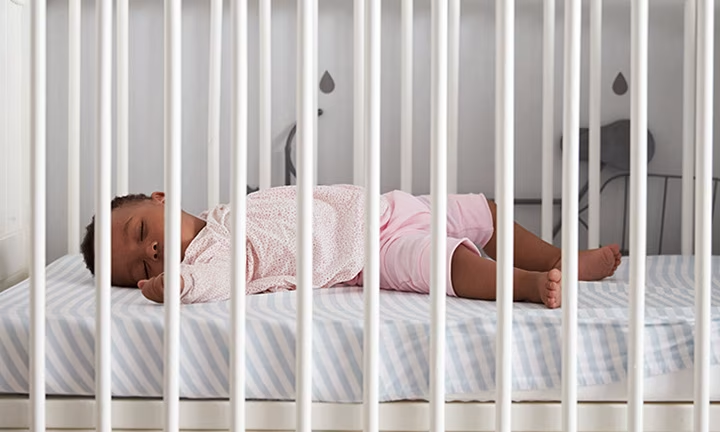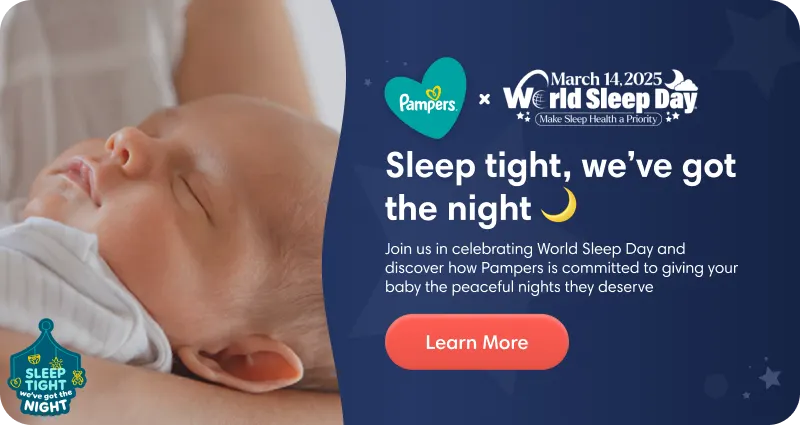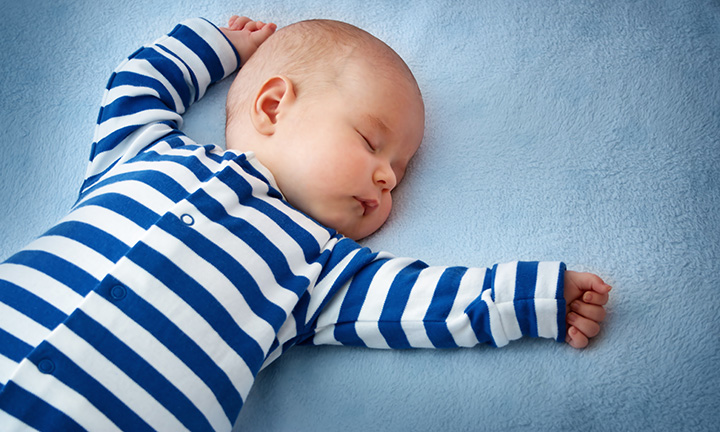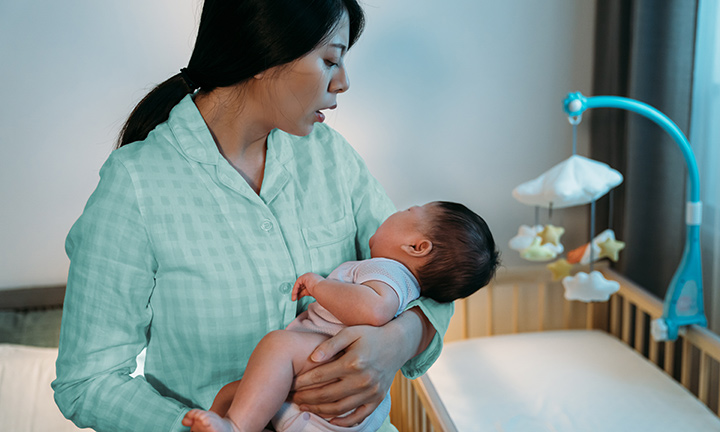
Why Bedtime Is Important for Babies and Toddlers
Despite all the pictures of smiling, playing babies, the fact is, babies and children need lots of sleep in the first year of life. In fact, even by their second birthday, a well-rested child has been asleep more hours than they’ve been awake. Newborns don’t follow any real schedule of sleep, but by 4 months old, many children have started to sleep more at night than during the day. A consistent, early bedtime can help babies to get used to sleeping longer at night, and can help make sure your child gets enough sleep. It turns out there are multiple benefits to having an appropriate bedtime.
How Much Sleep Does Your Child Need?
In general, the NHS shows that babies 3-months-old or less usually sleep as little as 8 hours, but often between 16 and 18 hours per day (in fact, babies up to one year old sleep more than they’re awake). As they get older, the number of hours of sleep they need gradually reduces, but even at a little more than a year, it’s still 12 to 15 hours a day until around 2 years old. While some of that sleep comes in the form of naps, most of it is consolidated into a long period overnight. So, if you’re wondering what is the best bedtime for a 3-month-old or younger, there may not be an ideal time until your little one is over 3 months.
Why Does Baby and Toddler Bedtime Matter?
While it’s certainly possible for a child to simply fall into an appropriate or regular sleep pattern that happens to fit your own sleep schedule, there’s just one problem - they almost never do so on their own. Your baby might naturally wake up as early as 5:00 am. Too late a bedtime means they’ll still awaken, but with less sleep. It has been shown that babies, after 3 months of age, in a consistent routine (including a reasonable ‘baby’s bedtime’), will fall asleep faster and stay asleep longer. Sleep fundamentals like this can make a huge difference to your baby’s sleep. It has to be said that you cannot control your baby’s sleep patterns. However, you can absolutely encourage your baby towards sleep, and after 3 to 4 months old, can help make the environment one with consistent bedtimes and routines. Remember, babies that young are still learning things as basic as the difference between night and day. Helping them learn (by, say, quieting down your home and activities at night) can help them start to fit a schedule of sorts.
Baby and Toddler Bedtime by Age
With all of that said, what time ‘should’ a baby go to bed? While GPs and Midwives don’t necessarily have recommended times to sleep (most advice runs along the lines of ‘when you see your child is sleepy, let them sleep’), here’s a loose guide that many parents use for their children’s bedtime – but, of course, each child is unique and by noticing their sleep cues, you can find the best bedtime for your little one:
That Drowsy Window Matters
Babies aren’t very subtle – you can usually easily see when a baby is starting to get drowsy. They may pull their ears, get much quieter than usual, rub their eyes, or actually yawn as it gets closer to the evening and bedtime. These sleep cues are your sign to get the baby comfortable for sleep (for example in their own cot), to give them a chance to nod off. Experts recommend putting a baby down to sleep when they are drowsy or groggy; this gets them to associate being put in their cot with sleepiness, which may help make the connection better later on. All people, regardless of age, go through a nighttime sleep cycle, cycling between REM (Rapid Eye Movement) and NREM (Non-Rapid Eye Movement). While it is unclear exactly why humans need this cycle, we do know that it is necessary for a healthy mind, and babies have increased amounts of REM sleep, which means they can wake up more often that adults do. As adults, we’re not always aware that we slightly awaken and resettle at night between cycles. Babies and children do too, and when they learn to self-soothe, they can fall back asleep without fully waking or crying. An overly tired baby or toddler who stays up past their natural bedtime window will have a harder time self-soothing. A child who can fall asleep on their own at bedtime is also better able to calm themselves overnight.
Children Thrive on Routine
It is well-accepted by many researchers (and parents!), that use a calming bedtime routine is very good for encouraging your child to sleep longer at night. When a young child knows what to expect, they feel secure, and understand that such a routine means it’s time to sleep. A bath, story, cuddles and a kiss goodnight are common ways to assure a calm environment before bed. This creates and association in the child’s mind with the approach of sleep, and can help them self-settle better as time goes on.
Behavioural and Cognitive Connections
Several studies have shown that for children, good, fitful sleep (which could be a benefit of early bedtime) is absolutely important for their good cognitive development. Good sleep in children is linked to such things as attention, learning, memory development and behaviour. For example, good sleep is crucial to learning; one study showed that 3-month-old babies had better memories if they took a nap after learning something new. Sleep is also a big factor in regulating emotions. Some babies have produced grins or smiles during sleep, which may proceed them giving their first real smiles when awake.
It’s Not Just Mental
Several studies have shown that not getting enough sleep can be harmful for babies (and adults for that matter). A lack of good sleep has been linked to low cognitive abilities, increased cardio-metabolic risk and increased chance of ADHD. Babies also grow while asleep, and thus need lots of sleep to continue developing, both their bodies and their actual brains. The release of certain growth hormones also peaks during your baby’s sleep; not getting enough sleep might literally inhibit their growth. Don’t forget that a major factor in getting good sleep is cutting down screen time and making sure your baby plays enough and gets good exercise.
Early Bedtimes May Benefit the Whole Family
By setting a bedtime and counting backwards to figure out when dinner should be (which is why earlier parts of this article suggested 7 or 8 might be a good time), you can sort of plan when to do other things as a family, like have dinner together or settle down for the evening yourselves. In addition, you may soon find your child resists less, wakes less often during the night, and is easier to get along with during the day. Keep in mind though that, other than putting your little one to bed at night, there may not be more routine that you can give your baby to make the perfect infant or toddler bedtime. Especially at young ages, it may be wiser to simply ‘go with your baby’s flow’, that is, follow their internal sleeping and feeding schedule for the first few months, which may work out and keep your baby (and you) at their happiest.
For better baby sleep, establishing a bedtime routine after your little one is about 3 months old, can benefit both you and your baby. A good bedtime is usually between 6:30 and 7:30 pm; however, each child is different and it’s best to take note of their sleep cues before settling into a routine that works for them.
To help you develop a customised sleep schedule for your little one, try the Smart Sleep Coach by Pampers. This innovative app can analyse your baby’s sleep patterns and tailor a routine suited to their sleep needs.
Remember, early bedtimes contribute to a well-rested baby, and staying up late doesn't guarantee later wake-up times. To further enhance your baby's sleep routine, take advantage of a FREE sleep assessment by Smart Sleep Coach for personalised support tailored to your child's needs.
FAQs at a Glance
There is no real answer to this question, because babies set their own bedtimes and follow their own circadian rhythms. While there are general ideas about this (the infamous 7pm-7am ‘rule’) the fact is, each and every baby will be different.
So, what time ‘should’ baby go to bed? It’s better to make it easy for your baby to fall asleep, such as:
- Having bedtime routines
- Making sure to play and exercise during the day
- Cut or eliminate the amount of screen time your baby experiences
The Bottom Line
Setting a bedtime for your baby can be an important step in helping them be their healthiest and develop in their best way. That said, many experts agree that setting a concrete, strictly followed bedtime might not necessarily be the best thing to do, especially in the beginning of your infant’s life. Your baby will be growing and changing a lot in their first year or two, and their natural needs will necessarily play a stronger role in how you deal with them. For babies past a few months though, setting an early bedtime (perhaps around 7pm), can be useful in helping your baby learn the difference between night and day, and giving their own internal circadian rhythm time to play out naturally. Once children enter their second and third year of life, an early bedtime routine can, for some, be the difference between getting a good sleep and not being as happy to see you in the morning!
- Basis. Basis: Normal Infant Sleep.
- BBC. The Science of Healthy Baby Sleep.
- BBC. Secrets of Baby Sleep: How Snoozing Helps Your Baby’s Development.
- Healthier Together. Healthy Sleep.
- NHS. Helping Your Baby to Sleep.
- NCT. Toddler Sleep: How to Help with any Problems.
- Vyazovskiy, V. & Delogu, A. NREM and REM Sleep: Complementary Roles in Recovery after Wakefulness.



